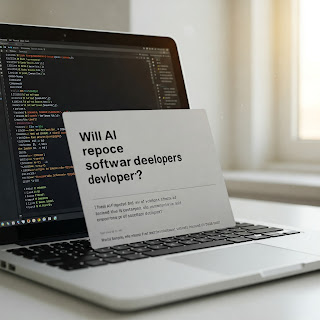Will AI replace software developers?
The hype around artificial intelligence is undeniable, and its growing capabilities are reaching into almost every industry. One industry that often gets the spotlight is software development. The question that worries many, from novice coders to seasoned professionals, is obvious: What will happen to developers when AI can program?
This is no longer just a hypothetical scenario. We are already seeing AI tools that can generate code snippets, automate repetitive tasks, and even assist with debugging. This has led to both excitement about improving efficiency and concerns about job security.
Understanding the Current State of Things: AI as a Co-Pilot, Not a Replacement (yet)
It’s crucial to understand that while AI is making significant strides in code generation, it’s not yet ready to completely replace human developers. Today’s AI programming tools excel at specific, well-defined tasks. They can:
* Automate boilerplate code: Generate repeatable code structures for common functions.
* Offer code completion: Predict and suggest next lines of code, increasing speed.
* Assist in debugging: Identify potential errors and suggest fixes.
* Generate simple websites and apps: Based on templates and user input.
However, true software development involves much more than just writing code. It requires:
* Problem definition and analysis: Understanding complex business needs and translating them into technical requirements.
* Creative problem solving: Developing innovative solutions to unique challenges.
* System design and architecture: Planning the overall structure and interactions of software systems.
* Collaboration and communication: Working effectively with clients, designers, and other developers.
* Understanding context and nuance: Considering the broader business implications and user interactions.
* Ethical considerations: Ensuring responsible and unbiased AI development.
These are areas where human intelligence, with its capacity for abstract thinking, empathy, and contextual understanding, currently has a significant advantage.
The evolution of the developer role: From pure coder to orchestrator
Rather than a complete replacement, the more likely scenario is a significant evolution of the developer role. We can expect a shift toward:
* AI integration specialists: Developers who understand how to effectively use AI tools and integrate them into development workflows.
* Problem Architects: Focus on high-level design and architecture of complex systems, guiding AI through implementation.
* Domain Experts: Combine coding skills with deep domain knowledge to guide AI in creating customized solutions.
* AI Ethical Guardians: Ensure that AI-generated code is fair, secure, and ethical.
* Continuous Learning: Adapt to the ever-changing landscape of AI tools and methods.
Buying and Selling in the Age of AI
The dynamics of buying and selling software development services are also being impacted by:
* Buying: Businesses may increasingly look for developers who can demonstrate the ability to use AI tools to create faster, more cost-effective solutions. The ability to manage and integrate AI-driven development processes will be a key differentiator.
* Selling: Developers will need to highlight their unique skills that go beyond pure coding, such as problem solving, communication, and domain expertise. Demonstrating the ability to effectively collaborate with AI will be crucial to attracting customers.
The Future of Collaboration: Human Ingenuity Combined with the Power of AI
Ultimately, the future of software development is likely to be collaborative. AI will become a powerful assistant, augmenting human capabilities and freeing developers from repetitive tasks. This will allow developers to focus on solving higher-level problems, innovating, and building more complex and efficient software.
Instead of fearing replacement, developers should seize the opportunity to learn and adapt. By understanding the strengths and limitations of AI, and by focusing on uniquely human skills, developers can position themselves at the forefront of this exciting new era.












Comments
Post a Comment